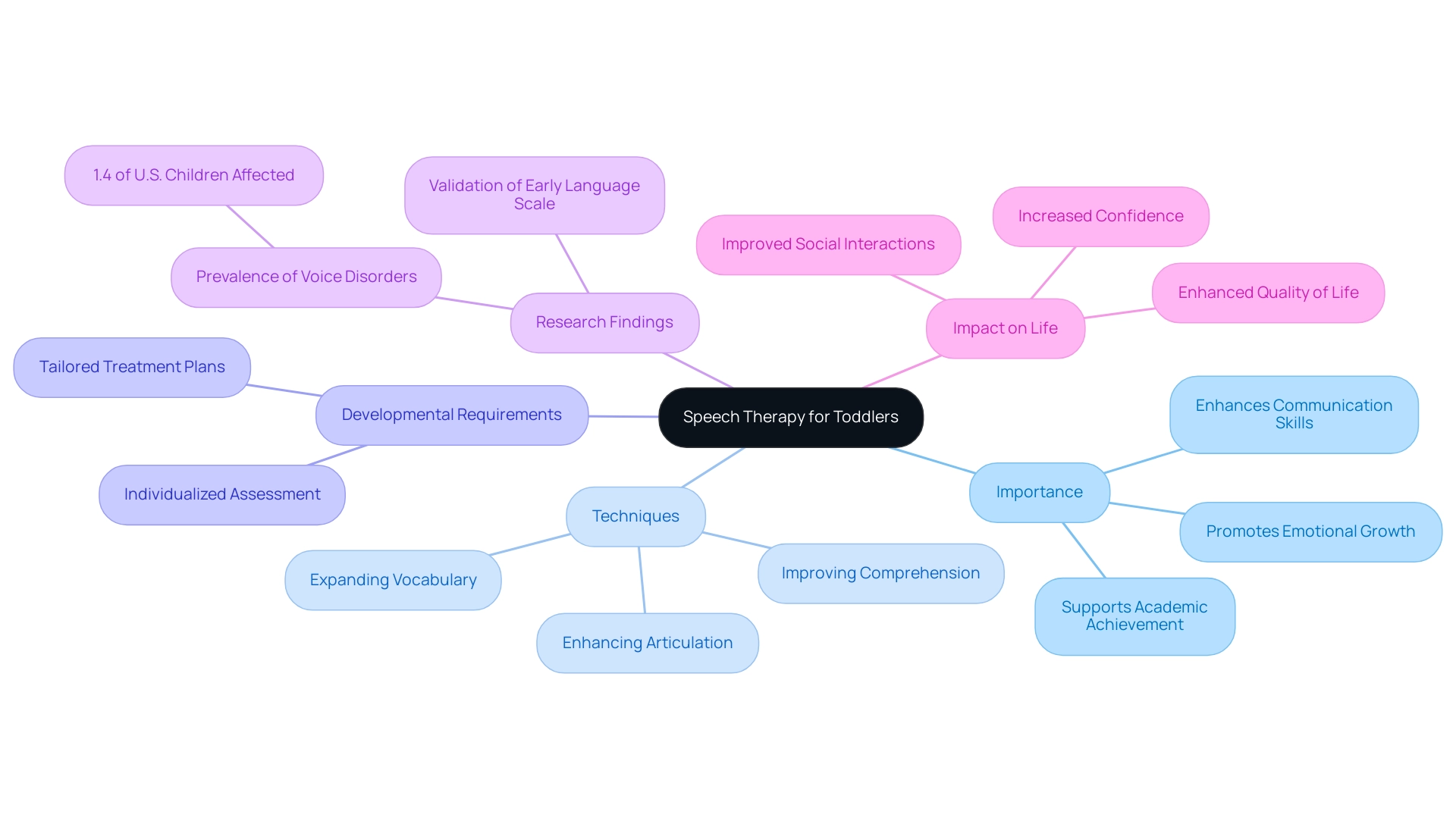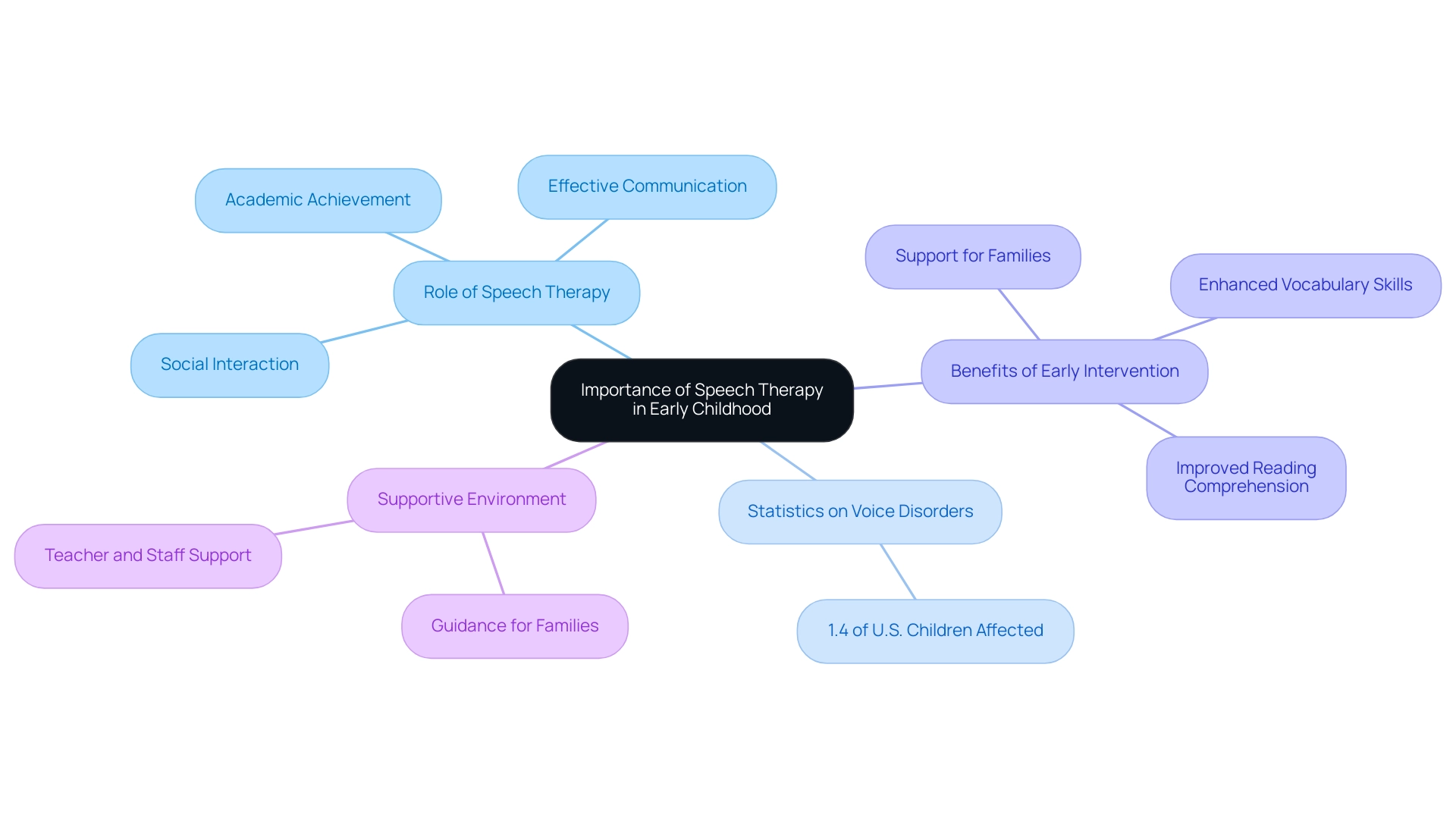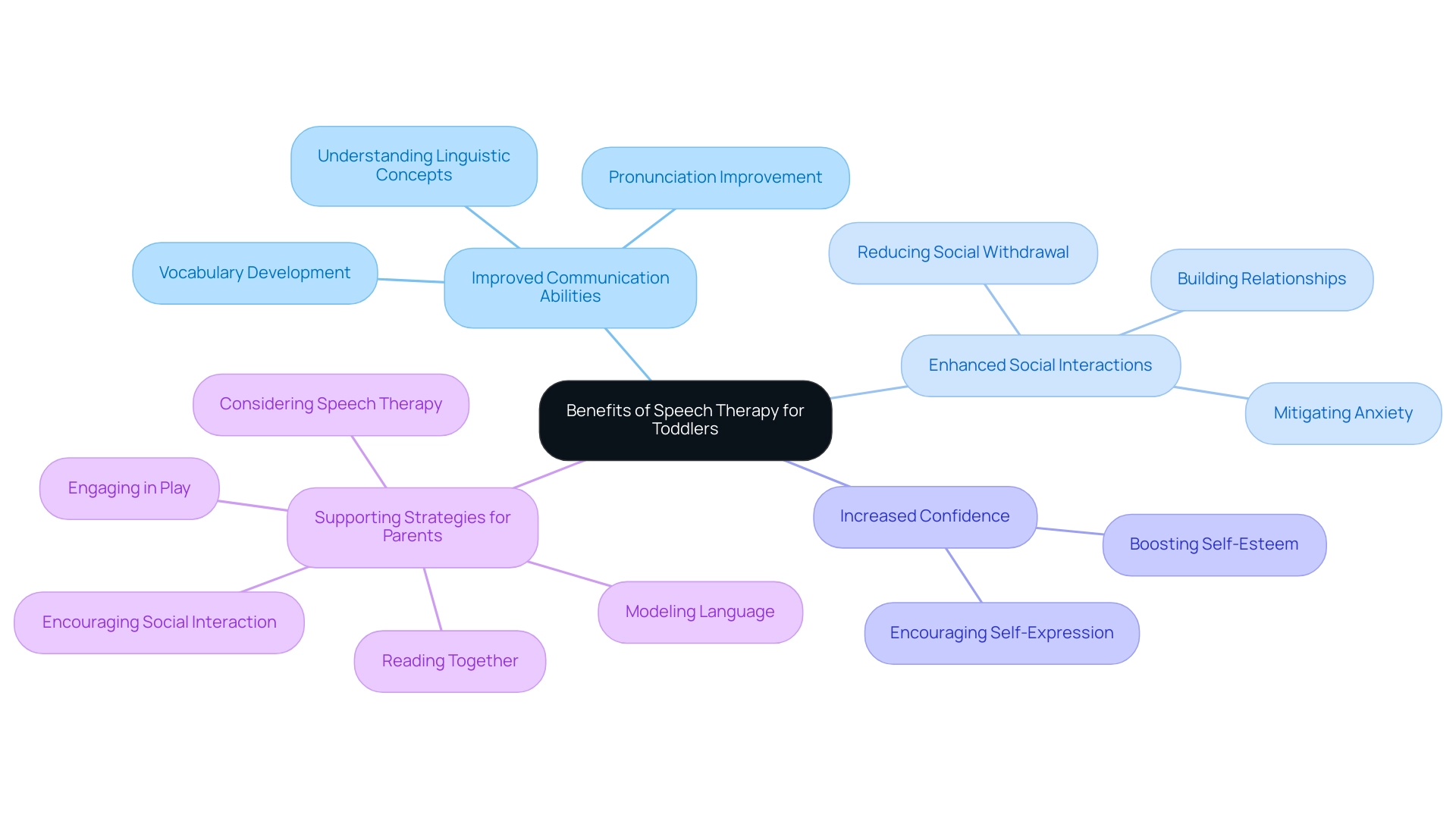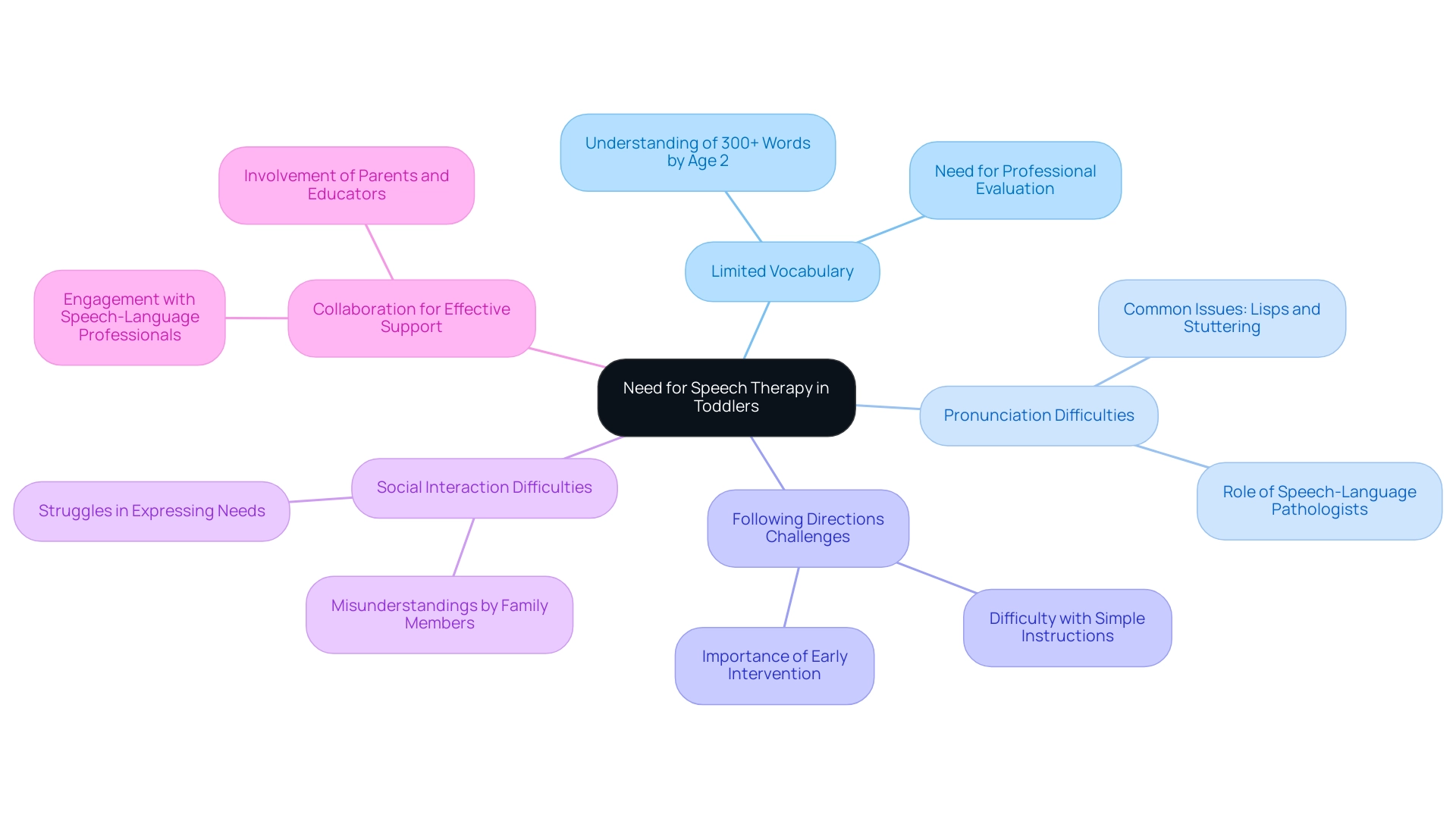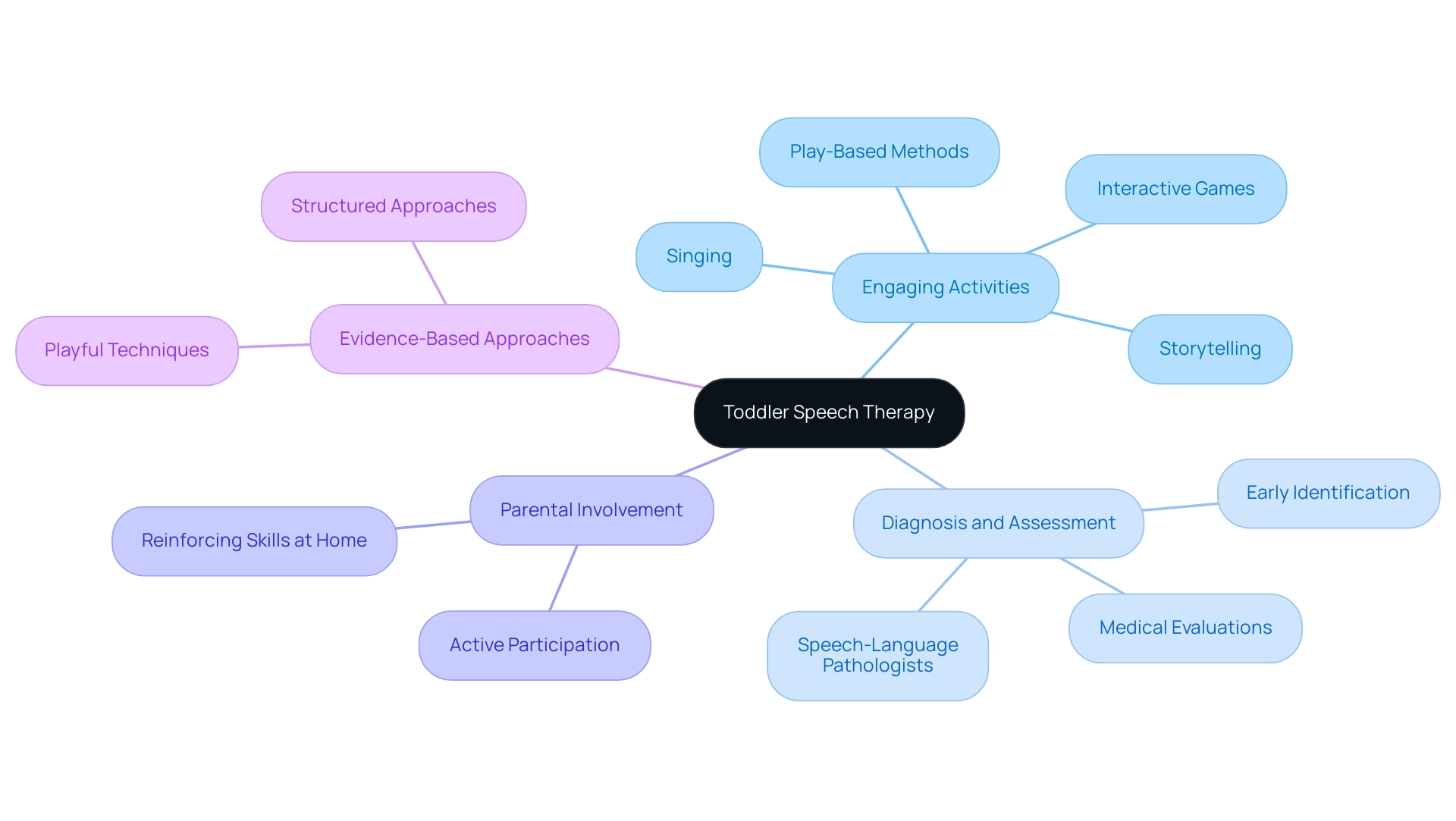Introduction
In the realm of early childhood development, speech therapy emerges as a vital resource for fostering essential communication skills in toddlers. As many children encounter speech and language disorders that can hinder their ability to express themselves, timely intervention becomes paramount. This article delves into the significance of speech therapy, exploring its role in enhancing verbal abilities, social interactions, and overall emotional well-being.
By examining the benefits of early intervention and recognizing the signs that indicate a need for therapy, parents and caregivers can better support their children's communication journeys. Furthermore, insights into what to expect during therapy sessions provide a comprehensive understanding of how these interventions can be tailored to meet individual needs, ultimately paving the way for a brighter future in communication and learning.
1. Defining Speech Therapy for Toddlers
Speech therapy for toddlers acts as an essential measure aimed at promoting effective communication abilities in young ones. This specific type of treatment, which is speech therapy for toddlers, focuses on different communication and language issues that can hinder a toddler's verbal expression, resulting in difficulties in academic achievement, social interactions, and emotional growth, as emphasized by the case study regarding the effects of these disorders on both youngsters and adults. It employs a diverse array of techniques and activities aimed at enhancing articulation, expanding vocabulary, and improving overall language comprehension.
Significantly, these measures are tailored to address the distinct developmental requirements of every young individual, thereby enhancing their capacity for communication. Recent advancements, such as the validation of the Early Language Scale in a study by Visser-Bochane et al., published in EUR J Pediatr in January 2021, underscore the importance of early diagnosis and tailored assessment tools in addressing these disorders. Considering that roughly 1.4% of U.S. youngsters experience a voice disorder persisting for a week or more, which can greatly impact their communication and social interactions, the necessity for effective speech therapy for toddlers as an intervention is clear.
2. The Importance of Speech Therapy in Early Childhood
Speech therapy for toddlers plays a crucial role in early childhood, establishing a strong foundation for effective communication—an essential component of social interaction and academic achievement. Studies show that around 1.4% of U.S. youths encounter a voice disorder lasting a week or more, emphasizing the pressing requirement for prompt action. Prompt communication support can significantly improve a young person's capacity to convey ideas and feelings, nurturing better connections with peers and adults.
Addressing communication and language delays promptly by utilizing speech therapy for toddlers not only mitigates the risk of future learning difficulties but also reduces potential emotional challenges as young individuals mature. Notably, research suggests that a significant percentage of late-talking toddlers may outgrow language delays with the help of speech therapy for toddlers if addressed early, leading to better outcomes in reading and writing skills later in school. Furthermore, studies show that early support, including speech therapy for toddlers, is linked to improved reading comprehension and vocabulary skills, underscoring its significance in academic success.
As noted by a parent involved with JB: All of the teachers and staff at JB are patient and willing to take the extra time to make sure we, as parents, understand and are comfortable.
This reflects the supportive environment that is crucial for families navigating the complexities of language development, ensuring that young ones receive the guidance they need to thrive while also highlighting that
early intervention not only aids in skill growth but also offers essential support and direction for families.
3. Benefits of Speech Therapy for Toddlers
Engaging in speech therapy for toddlers offers substantial advantages like improved communication abilities, enhanced social interactions, and increased confidence in self-expression. Studies show that young individuals undergoing language intervention frequently exhibit significant advancement in vocabulary development, pronunciation, and understanding of linguistic concepts. For instance, among youngsters aged 7 to 11 years in Australia and Germany, the prevalence of spoken language disorders ranges from 3.4% to 18.9%.
Prompt identification and intervention are vital; timely verbal assistance, such as speech therapy for toddlers, can result in significant enhancements in communication abilities, which are important for academic achievement and social integration. Parents and caregivers can further support language development through strategies such as:
- Engaging in play
- Modeling language
- Reading together
- Encouraging social interaction
- Considering speech therapy for toddlers
As children become more adept at expressing their thoughts and feelings, they often experience a boost in self-esteem, reducing the likelihood of social withdrawal or anxiety associated with communication disorders.
JB Parent, a guardian engaged in communication support, reflects,
All of the teachers and staff at JB are patient and willing to take the extra time to ensure we, as parents, understand and feel at ease.
This highlights the supportive environment fostered through professional engagement, which plays a pivotal role in nurturing healthy emotional development and enhancing social skills, particularly in mitigating issues like low self-esteem and anxiety.
4. Recognizing the Need for Speech Therapy in Toddlers
It is crucial for parents to recognize several key indicators that may suggest their toddler requires speech therapy for toddlers. For instance, by the age of two, youngsters can typically understand over 300 words; thus, a limited vocabulary may raise concerns. Additional signs include:
- Difficulty pronouncing words
- Challenges in following simple directions
- Difficulties with social interactions
According to Ashley Waguespack, MS, LOTR,
Speech-language pathologists help with lisps and stuttering, but they also help in numerous other ways.
If a young person consistently struggles to express their needs or is often misunderstood by family members, consulting a speech-language pathologist for an evaluation can provide invaluable guidance through speech therapy for toddlers. Interacting with experts allows parents to track their offspring's language development efficiently without undue worry.
Moreover, continuous observation of a young person's behavior is crucial for recognizing possible language disorders, as emphasized in the case study titled '
Monitoring Young Behavior for Language Disorders.' Effective support for speech therapy for toddlers requires collaboration among parents, educators, and speech-language professionals. Additionally, recent investigations into the effectiveness of articulation treatment through tele-practice during the COVID-19 pandemic have shown promising results, emphasizing the importance of adapting to new methods of care.
5. What to Expect in a Toddler's Speech Therapy Session
During speech therapy for toddlers sessions, parents can anticipate a variety of engaging activities specifically designed to meet their offspring's individual needs. Typically, speech therapy for toddlers sessions incorporate play-based methods that encourage communication through storytelling, singing, and interactive games. Such approaches not only make learning enjoyable but also foster natural communication skills.
The case study named 'Diagnosis and Assessment of Language Delay' emphasizes that
early identification through medical evaluations and assessments by speech-language pathologists is essential for effective diagnosis and prompt action. According to a study involving 240 youngsters aged 2 to 5 years, these interventions have been shown to significantly enhance communication outcomes. The therapists regularly evaluate the individual's progress and modify techniques as necessary to promote effective learning outcomes.
Importantly, parental involvement is a key factor in the success of speech therapy for toddlers. Parents are encouraged to actively participate, reinforcing skills learned during therapy at home, thereby creating a supportive environment that significantly enhances the development of the young one. As noted by Roulstone, Marshall, and Powell, 'Evidence-based intervention for preschool children with primary speech and language impairments' underscores the importance of structured yet playful approaches in fostering communication skills.
Conclusion
Speech therapy for toddlers is an essential resource that addresses speech and language disorders, paving the way for improved communication skills and overall development. The significance of early intervention cannot be overstated, as it plays a critical role in enhancing a child's ability to express themselves, facilitating better social interactions and academic success. By recognizing the signs that indicate a need for therapy, parents and caregivers can take proactive steps to support their children on their communication journeys.
The benefits of speech therapy extend beyond mere vocabulary and pronunciation improvements; they encompass emotional well-being and social confidence. Through tailored sessions that incorporate engaging activities, children not only learn to communicate more effectively but also gain the self-esteem necessary to interact with peers and adults. This supportive environment fosters a love for learning and encourages healthy emotional development.
In conclusion, timely and effective speech therapy can significantly alter the trajectory of a child's communication skills, impacting their academic performance and social relationships. By collaborating with speech-language professionals and remaining vigilant in monitoring developmental milestones, parents can ensure that their children receive the guidance they need to thrive. Investing in speech therapy today lays the foundation for a brighter, more communicative future.
